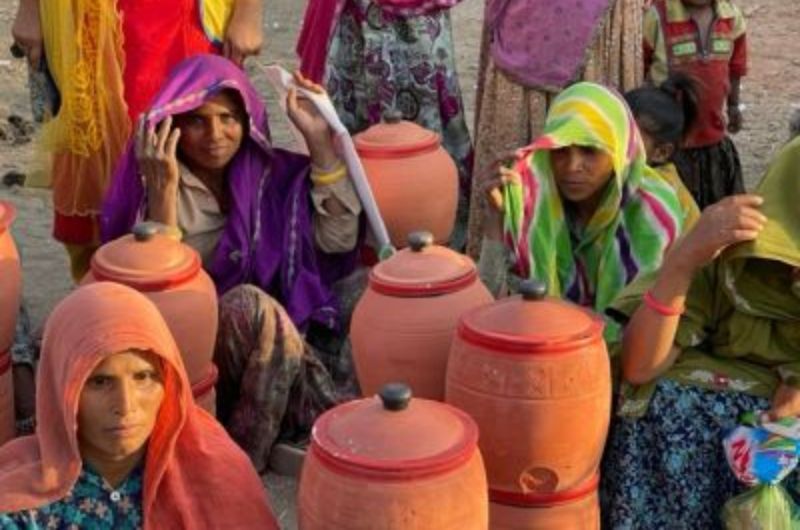Rajasthan is known for its erratic rains, scorching heat, dry wells and receding water table. Water scarcity in the region has made safe piped drinking water a distant reality for its inhabitants. Sirohi District, situated in a mountainous and rugged terrain, also has its share of water problems. The south and south-east parts of the district lie between Mount Abu, the only hill station in Rajasthan, and the spine of the Aravalli. Since the topography makes the task of water supply even more difficult, people are forced to consume water collected from contaminated or unsafe sources
Dungar Singh, who runs a hardware shop in Kalindari Village, about 20 km from the district headquarter says, “Sirohi had received good rainfall in 2017 but otherwise it is a water deficit place. The high fluoride and brackish content further adds to our woes. Whether it is the hilly region, inhabited by mostly tribal population or the urban areas of the district, getting safe water is almost an arduous task. One has to shell out around Rs 500 to get a water tanker. Water supplied through the government water tankers is often not adequate for family needs.”
“Those who can afford get the water tankers or have water purifiers installed in their houses, but that’s a luxury most of the poor tribal population certainly can’t afford,” says Anju Chauhan, a forest guard, adding that “lack of electricity in their phalis (hamlets) is also an issue.” Staying in a village 35 kilometre away from the district headquarters, she says the tribal people mostly use water collected from beris (dug wells) or hand-pumps. The region bears the additional burden of silicosis – a form of lung disease caused by inhalation of crystalline silica dust, resulting from the presence of growing granite and sand mining units, she points out.

While people like Anju and Dungar are well aware of the parched reality of their region, for Dhawal Trivedi, the water woes of his native place came as a shock during the COVID-19 lockdown. Dhawal works at a cruise service in the United States. As his work came to a halt due to the lockdown, he was with his parents in Ud Village in Sirohi Block. It is when the RO purifier in their house stopped working that he got to taste the impurified water for the first time, which he found strange and hard. Soon, he was prompted to get the water tested in a lab. The samples collected from different places revealed shocking results.
Later, Dhawal also collected a report from the Chief Medical & Health Officer (CMHO), which corroborated the prevalence of waterborne diseases in the Sirohi Region due to contaminated water. The report (January to December 2020) highlighted the prevalence of acute diarrhoeal diseases including gastroenteritis and enteric fever in Reodar, Pindwara, Sheoganj, Sirohi and Aburoad Blocks of the district. Sirohi Block was reportedly the worst hit.
At times, the water might get contaminated either at a PHED storage place or through unclean pipelines, Dhawal was told. If even the piped water supply is not safe to drink, think of the open, neglected water wells and ponds, he thought. As an individual, motivated by curiosity and his training as part of MBA course in Entrepreneurship and Leadership, he felt the urge to find a solution to the problem and help communities. After going back to Seattle, he founded the Right2WaterFoundation in October 2021 along with his like-minded friend, Kasy Smith. With whatever resources they had, they launched the non-profit initiative to provide free access to clean drinking water in his native place, he said.
“We designed an eco-friendly water purifier made of terracotta clay and a diatomaceous earth filter in it. The clay makes the water alkaline, and diatomaceous earth kills the bacteria and other impurities, including dust. The water purifier doesn’t need any electricity, and no water is wasted during filtration. The foundation has so far distributed 1000 purifiers for free to the most deserving tribal families,” Dhawal says.
Tejaram’s family from Amli Village was simply thrilled when they tasted the purified water from their newly received purifier. “The water tastes just great. No one ever thought of solving the poor water condition here,” Tejaram says while thanking the foundation for providing free purifiers to his family and other needy families in the village. S. Rawal, another resident of Amli Village, believes that filtered water will surely help reduce waterborne diseases because excessive fluoride is already impacting the health of new-borns as well as pregnant women in the region.
Manisha Deol, a teacher from Goyali Village, says she would love to have such filters for her school. At present, the school has only one, which was acquired for a demonstration to the local people.
As far as the material of the purifier is concerned, the foundation gets the terracotta mould made in Morbi, Gujarat, from where it gets transported to Sirohi for distribution. So far, they have distributed the water purifiers in the villages of Pindwara and Sirohi Blocks. By the end of 2022, the foundation aims to distribute about 10000 more water purifiers. As of now, they are exploring ways to enhance the durability of the model as it requires special care to avoid breakages during transport.
(Courtesy: Charkha Features)
May 2022



 from Webdoux
from Webdoux